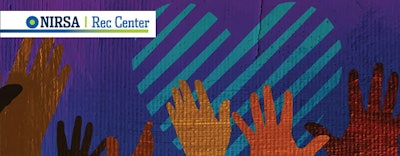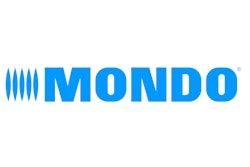
In September — as colleges and universities around the country rose to meet the challenges of reopening safely in the midst of a global pandemic — almost 800 campus recreation professionals representing about 250 NIRSA member institutions also committed to participating in a new program to create more diverse, inclusive and equitable environments on their campuses.
NIRSA's 21-Day Racial Equity Habit Building Challenge for Campus Recreation, sponsored by Mondo and based on a concept introduced in 2014 by diversity expert Eddie Moore Jr., included weekly virtual small-group discussions and daily assignments featuring a mix of readings, videos and podcasts. The challenge was designed to focus on the Black American experience, and specific topics included racism at public swimming pools, uncovering implicit bias, and under-representation of Blacks and Hispanics at colleges and universities.
"The idea of taking the Racial Equity Habit Building Challenge and focusing it on the world of higher ed really was in sync with what we were hearing our members needed, and, frankly, the change we want to be in this world," says Erin O'Sullivan, NIRSA's director of advocacy and strategic partnerships, who spoke about the 21-Day Challenge on Episode 19 of The Athletic Business Podcast. "We particularly liked the challenge for its habit-building nature. We wanted to put resources into something that would provide a racial equity lens as a part of our members' daily lives, which would in turn impact their students and their communities."
O'Sullivan adds that many participants plan to continue the conversation that began during the challenge, which she says will boost personal accountability for weaving what they learned into their daily lives.
Ingrained inclusivity After a summer of civil unrest, that is exactly what campuses need right now, says Derek Hottell, director of recreational sports and interim director of the Health Promotion and Well-Being Center at Virginia Commonwealth University, where eight campus recreation staff members and student employees participated in the 21-Day Challenge.
"The George Floyd incident was a galvanizing incident for our country, which then became a galvanizing issue for NIRSA and campuses all over the country," says Hottell, who also is a member of NIRSA's Board of Directors, referring to the 46-year-old Black man killed by Minneapolis police officers on Memorial Day. "We needed to take a step back and ask, 'How do we actually engage with racial justice in a real and tangible way in the work that we do in our own sphere of influence?' Part of the answer is a learning journey, part of it is engagement with cultural humility and part of it is reaffirming existing values."
Inclusivity has been ingrained in the culture at VCU, where the total student population on the urban campus is more than 30,000, with approximately 45 percent of students identifying as non-white. As examples of that inclusivity, Hottell, who is white and straight, cites the campus recreation department's adaptive climbing program, as well as intramurals offerings that are structured as open leagues instead of co-rec leagues — making participation more inclusive for gender-nonbinary individuals.
At the University of Central Florida, 13 campus recreation staff and graduate assistants participated in the 21-Day Challenge. "For me, it's important to build relationships with colleagues, and to be able to have difficult discussions and learn what it's like to have civil discourse," says UCF Recreation and Wellness Center assistant director Andrea Snead, who is Black and gay. "That's how you begin to understand a person's journey and see how they view things. And at the same time, they can see how you view things."
'Opportunity to impact all'
Like VCU, the University of Central Florida has a diverse student body, with nearly a third of students identifying as Hispanic. The campus recreation department for years has promoted National Hispanic Heritage Month in September and this academic year is helping celebrate the university's first-ever female student body president and vice president, who both happen to be Latina.
"It's quite significant for people to see themselves represented in rec centers like that," says Snead, who also is a member of NIRSA's Board of Directors. "While a lot of people say the student union is the heart of campuses, I beg to differ. I think our rec centers are at the heart of everything, because that's where people come together with common interests. We've got such an opportunity to impact all of our students."
O'Sullivan agrees. "Given how segregated many campuses still are, this is a real opportunity," she says about the impact equity, diversity and inclusion efforts can make. "We know people are more open to learning, engaging with new ideas and challenging preconceived notions if they're in an environment they trust and are comfortable with. This opportunity comes with responsibility, too. Even though the majority of students are engaging with recreation, we have to look at who is not engaging and why."
To that end, VCU's campus recreation department has created its own 13-member Equity, Diversity and Inclusion Committee.
"It's important to take a step back and figure out how we can do things better," Hottell says, adding that the committee will evaluate engagement based on race and ethnicity to determine how well the department serves students with different identity markers. "What does the data say about who you serve and how well you serve them? We have to ask those questions and see if there is a difference based on racial identity. That's not going to be the end solution, but certainly representation of diversity is a huge place to start."
He also notes that many VCU students are politically active and have participated in protests related to the Black Lives Matter movement and Confederate monuments in Richmond. The university's Health Promotion and Well-Being Center even provided students with guidelines for safe and responsible protesting during COVID-19.
UCF boasts a politically active student body, too, but Snead also views equity, diversity and inclusion as more personal. "At the end of the day, I think learning about other people and their journey is really going to enrich your own life," Snead says.
As O'Sullivan emphasizes, systems don't change unless people do, and campus recreation professionals are in a position to impact a wide range of people.
"The main thing is to continue to nurture the habit of using a racial equity lens in your daily life," she concludes. "This means opting into difficult conversations, asking questions — about everything from policies and procedures to your social media feed and news articles you read — looking at whose voices and perspectives are and are not being included in the tables you sit at, examining who the programs and services you offer have been built for, and so forth. There isn't an end to this work. This is every day, every interaction, every decision."
'Begin with awareness, follow with empathy'Campus recreation professionals and student employees weren't the only people who participated in NIRSA's 21-Day Racial Equity Habit Building Challenge for Campus Recreation. Employees of several NIRSA associate members did, too, and one of them — sports surfaces manufacturer Mondo — sponsored the challenge. AB asked Latasha Pittman, Mondo's director of marketing and communications, about the company's involvement in the initiative. What prompted Mondo to sponsor the challenge? How does Mondo as a company promote diversity, inclusion and equity? How can Mondo employees and other NIRSA Associate members take what they learned during the 21-Day Challenge into their workplaces and communities to make a difference? |
This article originally appeared in the November|December 2020 issue of Athletic Business with the title "Campus recreation takes the lead in equity, diversity and inclusion strategies ." Athletic Business is a free magazine for professionals in the athletic, fitness and recreation industry. Click here to subscribe.





































